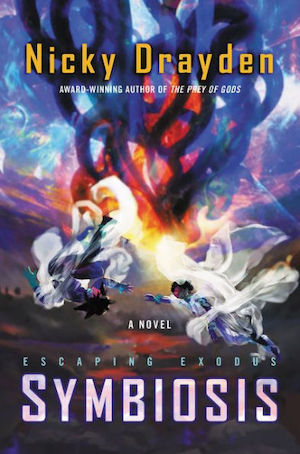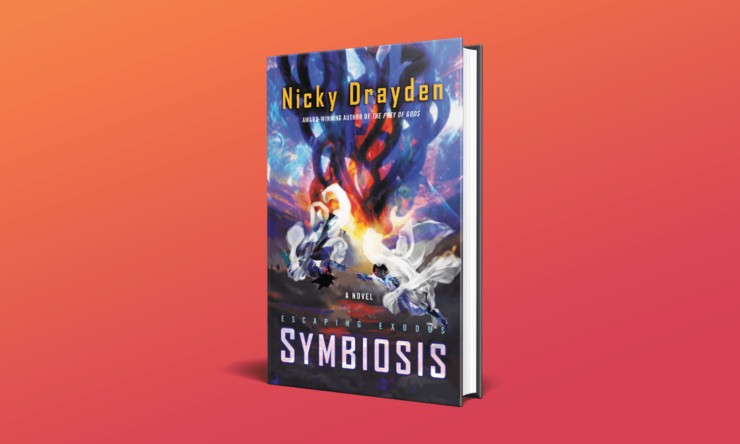An entire civilization’s survival depends on a pair of uneasy allies who must come together for one epic battle…
We’re excited to share an excerpt from Escaping Exodus: Symbiosis, a continuation of Nicky Drayden’s imaginative science fiction saga—available now from Harper Voyager.
Nearly a thousand years removed from Earth, the remnants of humanity cling to existence inside giant, space faring creatures known as the Zenzee. Abused and exploited by humans for generations, these majestic animals nearly went extinct, but under the command of its newly minted ruler, Doka Kaleigh, life in the Parados I has flourished. Thanks to careful oversight and sacrifice by all of its crew, they are now on the brink of utopia, and yet Doka’s rivals feel threatened by that success.
The Senate allowed Doka to lead their people believing he’d fail spectacularly—a disaster that would cement the legitimacy of their long-standing matriarchy. Despite vocal opposition and blatant attacks on his authority, Doka has continued to handle his position with grace and intelligence; he knows a single misstep means disaster. When a cataclysmic event on another Zenzee world forces Doka and his people to accept thousands of refugees, a culture clash erupts, revealing secrets from the past that could endanger their future. For Doka, the stakes are bigger and more personal than ever before—and could cost him his reign and his heart.
He has fallen for the one woman he is forbidden to love: his wife, Seske.
Doka and Seske must work closely together to sway the other Zenzee worlds to stop their cycles of destruction. But when they stumble upon a discovery that can transform their world, they know they must prepare to fight a battle where there can be no winners, only survivors.
I stare at the charts spread out before me, bunkered in my study, ancient tomes piled high all around me. This month’s report from the Environmental Research Initiative looks too good to be true. We’ve achieved an 80 percent reduction in energy usage, the waterways are flowing at record levels with no signs of pollution, and after accounting for the new composting program in the worm fields of the lower bowels, food waste is practically nil. In their recommendations, the ERI suggests that eight hundred more people can be awoken from stasis without a negative impact. I breathe a sigh of relief.
Which eight hundred will be the next question. I receive letters daily, dozens of them, sometimes numbering in the hundreds, begging for mothers, daughters, and loved ones to be freed from stasis. They say that life is passing them by, and if they are held any longer, they’ll be strangers to their own people when they are finally freed. I wish I could deny it, but I’m afraid they are right about that.
Buy the Book


Escaping Exodus: Symbiosis
In some ways those in stasis are the lucky ones. The first year of my reign was hard, there’s no doubt about that. It had been so difficult for most people to let go of their creature comforts. I put them to work, tearing down their old lives, brick by brick. Storefronts leveled, homes too, gardens left to grow wild, nuisance fauna reintroduced despite lengthy protests. It took an emotional toll on everyone.
But even though there were challenges and hardships, it was cathartic for those who lived through it. At least they got to process it all, to see the walls of bone torn down. To see that same material being grafted back into a hurting being. To see our world healing, and a new society growing from it. They were able to come to terms with their size in this universe.
Now, each release of citizens from stasis has proven to be more difficult than the last. So much has changed in these three years, and what they wake to is foreign and difficult to comprehend. Plus, there are now whispers from the ERI that hint at negative physiological and emotional effects from spending such an extended amount of time in the sleep pods, regardless of what world the people are waking up to. They won’t say anything about it outright, however. We all know how delicate this balance we have created with our Zenzee is and releasing too many people too quickly would be disastrous. Still, I feel great discomfort imagining the 2,361 souls still sleeping their lives away.
I push past the feeling and read through the rest of the recommendations.
They forecast that we will be self-sufficient within the next five years, and I’ll admit, that makes me feel smug. For so long we have been like parasites—taking, always taking—but now, we have a chance to give back to our Zenzee. To live in peace with her, in a state of mutualism. Imagine never having to leave this place. Never having to even think about culling another Zenzee or continue hunting for a habitable planet. Our descendants could live here for many generations to come.
But then I get to the last recommendation, and my mouth goes dry and tacky. I shake my head and read it again.
viii. It is the consensus of the Environmental Research Initiative that after reviewing the studies on the effects of the One Child Policy on the population, barring any unforeseen circumstances, we recommend rescinding the policy in a phased rollout within the next decade.
My mouth stretches into a smile, but really, I don’t know if I should be feeling happy or excited or scared. We are still weeks away from announcing Charrelle’s pregnancy, but the thought that my unborn child could have a sibling someday intrigues me.
How would this change family dynamics? Cultural stigmas? What if there’s backlash? So much of our lives have been built around this rigid family structure that our culture had become quite rigid as well. Two heart-wives and a husband, two will-wives and a husband, three heart-wives,
and a child to share between them. Yes, it’s efficient, but it’s also stifling. Seske is still sore about my mothers forcing a will-husband upon her. I know what she gave up to remain in this family with me, and I feel as though I failed her. Saddling her with the future possibility of having to bear a child would be rubbing salt into that wound.
I will omit that last recommendation in my presentation to the Senate. For now.
Instead, I will focus on the claim of self-sufficiency. Yes. Yes.
Yes.
Excerpted from Escaping Exodus: Symbiosis, copyright 2021 by Nicky Drayden










